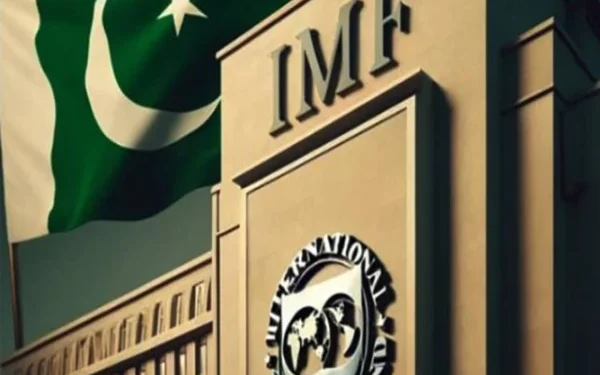Islamabad: In a crucial development for Pakistan’s economy, a staff-level agreement has been reached between the Government of Pakistan and the International Monetary Fund (IMF). This agreement marks a significant milestone in Pakistan’s ongoing economic reform efforts and paves the way for further financial support from the global lender.
Successful Negotiations Between Pakistan and the IMF
The negotiations between the IMF and Pakistani authorities were successfully concluded, leading to the agreement. According to a statement issued by the IMF, the discussions were led by Nathan Porter, the head of the IMF’s mission to Pakistan. As a result of this agreement, Pakistan has accessed an additional $1 billion under the Extended Fund Facility (EFF), taking the total disbursement to $2 billion under this program.
Pakistan’s Economic Progress Despite Challenges
Over the past 18 months, Pakistan has made significant strides in stabilizing its macroeconomic framework despite numerous challenges. The IMF acknowledged these efforts, stating that Pakistan’s economic situation has improved, and further enhancement is expected in the coming months.
One of the major indicators of economic stability highlighted by the IMF is the inflation rate. According to the IMF, inflation in Pakistan has reached its lowest level since 2015. This drop in inflation is a result of tight monetary policies implemented by the State Bank of Pakistan (SBP) and fiscal discipline exercised by the government.
Key Highlights of the IMF Statement
The statement released by the IMF outlines key aspects of Pakistan’s economic recovery and structural reforms. These include:
- Fiscal Deficit Reduction: The government remains committed to gradually decreasing the fiscal deficit while ensuring sustainable public debt levels.
- Monetary Policy Tightening: The central bank continues to implement a strict monetary policy to curb inflation and stabilize the currency.
- Energy Sector Reforms: Reforms are being introduced to reduce costs and improve efficiency in the energy sector, ensuring long-term sustainability.
- Economic Growth Acceleration: The government is focusing on economic expansion through investment-friendly policies and structural reforms.
Pakistan and IMF Agree on Resilience and Sustainability Facility (RSF)
In addition to the successful review under the EFF, Pakistan and the IMF have also completed negotiations on a new Resilience and Sustainability Facility (RSF) agreement. This new arrangement is designed to help Pakistan tackle structural vulnerabilities, particularly in response to climate change and natural disasters.
The RSF program will assist Pakistan in:
- Enhancing Climate Resilience: The facility will help Pakistan build resilience against natural disasters and mitigate the effects of climate change.
- Strengthening Budget and Investment Planning: This will ensure efficient allocation of financial resources, particularly in climate-sensitive sectors.
- Improving Water Resource Management: The program will focus on ensuring sustainable and productive use of water resources across the country.
- Advancing Energy Sector Reforms: The reforms will align with environmental protection goals, ensuring sustainable energy policies.
- Upgrading Climate Risk Analysis Infrastructure: Pakistan will strengthen its ability to assess and respond to climate-related economic risks through improved data and analytics.
IMF’s Endorsement of Pakistan’s Economic Reforms
The IMF has expressed confidence in Pakistan’s economic reform program, stating that it is being effectively implemented. The government’s commitment to fiscal discipline, monetary stability, and structural improvements is evident in its policies and actions.
The IMF emphasized that the successful execution of these reforms will not only stabilize the economy but also create a conducive environment for long-term financial independence. Pakistan’s ongoing commitment to economic discipline and structural adjustments is expected to enhance investor confidence and attract foreign direct investment (FDI).
Implications of the Agreement for Pakistan’s Future
The staff-level agreement with the IMF holds significant implications for Pakistan’s economic future. The continued financial assistance and policy guidance from the IMF will help the country:
- Ensure Economic Stability: The disbursement of funds will provide much-needed financial relief and stabilize foreign exchange reserves.
- Boost Investor Confidence: A successful agreement with the IMF often signals financial stability, encouraging both local and foreign investments.
- Address Climate Challenges: The RSF program will help Pakistan tackle climate-related economic disruptions, securing long-term sustainability.
- Strengthen Public Finances: Fiscal and energy sector reforms will ensure that Pakistan’s economic policies remain sustainable in the long run.
Conclusion: A Step Towards Financial Recovery
The agreement between Pakistan and the IMF represents a positive step in the country’s economic recovery journey. By adhering to the agreed-upon reforms and maintaining financial discipline, Pakistan is positioning itself for a more stable and resilient economic future. While challenges remain, the government’s commitment to implementing necessary reforms will be crucial in achieving sustainable growth and financial independence.
This latest IMF agreement reinforces the importance of economic reforms and prudent financial policies in overcoming Pakistan’s economic challenges. Moving forward, continued focus on structural improvements and policy execution will be vital in ensuring long-term economic stability and growth.

























